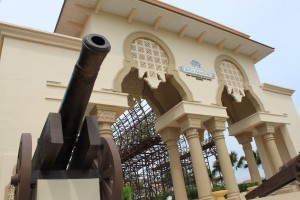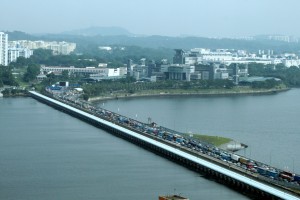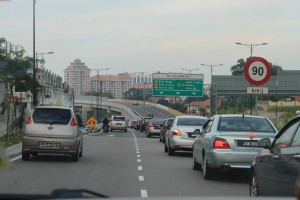 Touted as the crown jewel of southern Malaysia, Iskandar Malaysia (IM) was the highlight of the Tun Abdullah Badawi administration in his failed economic corridors rejuvenation effort.
Touted as the crown jewel of southern Malaysia, Iskandar Malaysia (IM) was the highlight of the Tun Abdullah Badawi administration in his failed economic corridors rejuvenation effort.
Post March 2008, in BN’s attempt to starve off the economic lifelines of the PR-run states of Penang and Selangor, more fiscal and administrative efforts were made to prop up IM while dishing out more contracts for its cronies. However the efforts have been unimpressive.
From 2006 to first quarter of 2012, IM only secured realised investments of RM 37.75 billion despite rigorous promotional efforts and generous tax incentives. A big chunk of this amount is in property investments (Star BizWeek, 26 May 2012).
In comparison, from 2008 to 2011 Selangor and Penang respectively registered RM 38 billion and RM 33.67 billion in manufacturing investments alone with no added specific tax incentives.
The Iskandar Regional Development (IRDA) forecasts that IM needs RM 383 billion worth of investments in order to succeed. Since 2006, less than RM 35 billion of foreign direct investment (FDI) has come in.
Johor DAP state chairman and Skudai ADUN Dr Boo Cheng Hau points out that with the way BN is running the government, many investors are sceptical of Malaysia’s administrative transparency and honesty.
“Arlida Ariff, the former chief executive officer (CEO) of Iskandar Investment Berhad (IIB), the investment company in charge of developing IM, was removed for allegedly awarding infrastructure contracts to her relatives. There has not been any action by MACC or the police on this case yet,” Boo began.
According to the Sun, some of these allegations also include infrastructure projects being awarded to other IIB senior executives’ relatives.
 “Even Johor BN-connected businessmen are unhappy with the way the projects have been given out. The bulk of the projects have been given to the BN federal government cronies. As for the foreign investors who are coming in, they are snapping up properties but not developing it,” he narrated.
“Even Johor BN-connected businessmen are unhappy with the way the projects have been given out. The bulk of the projects have been given to the BN federal government cronies. As for the foreign investors who are coming in, they are snapping up properties but not developing it,” he narrated.
Another issue is that of the bureaucratic hurdles in terms of licensing and local council service delivery, which also increases the propensity for corruption. The unclear separation of power for the various authorities in making decision doesn’t help either.
“If we don’t change our way of management in the government, it will be hard to retain the investors’ confidence in Malaysia. The foreign investors are sitting on the side for a change of government before committing to develop their investments.”
Flip-flopping labour policy
One of the perennial banes for businesses is the government’s flip-flopping policy on hiring policy of migrant workers. “We need to regularly study and estimate the number of workers needed for labour force requirements in order to regulate them,” he remarked.
“We can’t give lop-sided treatment to the businesses in freeing our migrant labour policies without taking into account the local’s social and economic wellbeing.” Indeed, a stable labour policy to facilitate the economic growth while giving the locals’ economic chances is long overdue.
He adds that Johor has a disproportionately high number of foreign migrant workers in Malaysia. “Around 15 percent of the state population are foreigners; at the same time many of our skilled workers are working in Singapore. This medley of contradictions is an issue that will cause long-term social and economic problems for Johor,” he said.
Inept Management
 Moving on, Boo touches on the state’s dismal finances. Perusing through some of the numbers reveals the extent of BN’s fiduciary negligence.
Moving on, Boo touches on the state’s dismal finances. Perusing through some of the numbers reveals the extent of BN’s fiduciary negligence.
“Johor Corporation Bhd (JCorp), the state government’s main investment arm, has been saddled with huge debt from it earlier aggressive and cavalier buying spree in the early 2000s. It has RM 3.2 billion debt due by 2013 and more than RM 6 billion in debt,” he detailed.
To improve its cash flow, it is restructuring its main investments in KFC Holdings Bhd (KFCH). KFCH is 50.6 percent owned by QSR Bhd, which in turn is 57.5 percent owned by Kulim Bhd, which is 53 percent owned by JCorp. (The Star, 4 December 2010).
To bring KFCH closer to JCorp, JCorp will potentially incur around RM 5.2 billion more debt to acquire KFCH. (The Edge, 21 May 2012).
“In many of the GLCs’ strategic transactions, there is a lack of transparency in its dealings. Questionable decisions and management is causing the state and its people to lose out substantially,” he remarked.
Another state GLC, Kumpulan Prasarana Rakyat Johor (KPRJ) sold its prized investments in Tebrau Teguh Bhd (TTB) without open tender to a private entity. TTB owns a RM 15 billion refinery and choice land banks in the Tebrau area which can be developed by the new private TTB owners for a lucrative sum. (The Edge, 31 January 2012).
“The state government-linked corporations (GLCs) are not showing transparency in awarding contracts. This is tarnishing the government’s image badly,” he said.
Prudence is not one of the state government’s virtues, it seems. “In 2008, Yayasan Pelajaran Johor (YPJ) could not account for its RM 73 million investments because RM 14 million of its subsidiary investments was not accounted for.”
“The Johor BN government needs to come clean and reform its ways in running the state GLCs. Some of the BN leaders may want to clean up its corrupted ways, but they fear political backlash if too much of the cobwebs are exposed for public scrutiny. The cronies are not willing to let go of the old ways; too much is at stake,” he points out.
Not Just the GLCs
Even the state government’s finances are in shambles. “Its debt currently stands at RM 1.38 billion, with almost RM 700 million carried over from Tan Sri Muhyiddin Yassin’s days as Menteri Besar in Johor. The bulk of that amount was incurred for water processing infrastructure,” Boo explained.
During the early 2000s Syarikat Air Johor (SAJ) -the GLC responsible for managing water resources for Johor- managed to reduce non-revenue water rate from 49 percent to 29 percent.
At the same time, water tariff for Johor has increased several times. “Now it’s almost three times that of Penang and one of the highest in the country. One wonders why Johor can’t pay off its water-related debt with such good revenue conditions,” he sneered.
“Now SAJ has been surrendered to the federal government’s water supply agency, Pengurusan Asset Air Bhd (PAAB). Water resources management is one of the few remaining areas where a state government has sovereignty in this federation where the federal government is increasingly powerful. This is tantamount to betraying the people’s trust,” Boo complained.
The state government’s poor management of cash is another glaring example. As a comparison, from March 2008 to 2010 Selangor’s cash reserve increased from around RM 400 million to RM 918 million in 2010.
From 2007 to 2010, Johor’s cash reserves dropped from RM 100 million to RM 38 million. “Where’s the accountability?”
“The state government’s arrogance has even affected the legislative arm. The state assembly had the audacity to conduct its state Standing Order Committee and Privileges Committee meetings in Kuala Terengganu in April. This is clearly against commonwealth parliamentary practice,” he said.
“The state speaker snubbed my query by saying it’s his prerogative to hold it where he deems fit. What is the motive of holding the state legislative meetings in another state? Are we a government in exile?”
A sign of a heartless government is unfair taxation; for Johor Bahru folks, the ridiculous toll rates are hitting the people’s pockets hard.
“Each day hundreds of thousands of Malaysians cross the Causeway to travel to and from Singapore for work, studies and shopping. An overwhelming majority of them pass through the Iskandar Customs, Immigration and Quarantine Complex (CIQ).”
“PLUS has been collecting toll on the Iskandar CIQ since the 1990s; it is estimated that between RM 876 million and RM 1.32 billion has been collected by PLUS without it having to build any highways extending from the Iskandar CIQ,” Boo explained.
“The toll is supposedly collected for the maintenance of the Causeway, which was built by the British in 1923. Now after building the Eastern Dispersal Link (EDL), PLUS is to levy toll on users who leave the CIQ and uses the EDL to travel to other parts of Johor Bahru.”
The initial proposed toll was RM 6.20 one way, averaging 76 sen per kilometre which is exorbitantly higher than DUKE, AKLEH or PLUS highways. As a result of public pressure and protests, the toll collection has been deferred until after the general elections (GE).
“Many of those who travel to and work in Singapore are wage earners already suffering from the Singapore economic downturn and its higher labour levy. This toll collection will affect their income substantially,” he bemoaned. – the Rocket.




